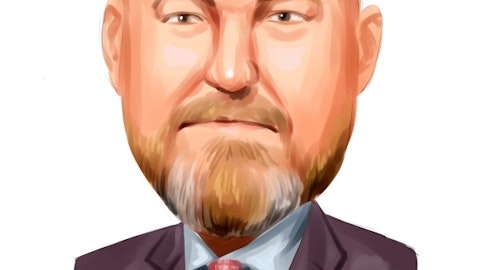But in a very strategic way, so going to clients together, developing solutions together literally developing strategy and going after the markets as real close partners. And that is — now you can ask what type of deal, typically, obviously, hyperscalers are involved in most of our cloud transformation deals. So the whole strategy that we’ve developed around full try has been paying off as well. And so how you should see it as a relation that is accelerating, that is gaining muscle every day, and we’ll continue to drive growth. The margin profile actually is rather good. And as you can imagine, if we are improving our operating margin, so significantly, it’s because the margin we are getting from our deals is going in the right direction. I think it’s also — we all know that, and it’s actually visible in our books that every time we are taking — winning a deal that is more where it’s more value-based, if you like, we are able to deliver better margins as well.
Gaurav Rateria: Lastly, if I can squeeze 1 full stride, TCV grew 25%. This is in context of what we are kind of hearing in the market that cloud spend is likely to moderate because of the macroeconomic environment. So would it be more of a phenomena of market share gain for you? Or you fundamentally believe that slowdown in cloud spend may not necessarily have happened as it was feared?
Thierry Delaporte: It’s interesting. Your question is a good one, Gaurav. I have a view on that, and let me tell you what I’ve observed, and I spend a lot of time with the hyperscalers, personally, is that there was a gap in our — there was a shortage in our ability to deliver there on their demand just because of the magnitude of the size of this market. And so the fact that they are slowing down doesn’t necessarily mean much in terms of impact for us. I believe that with the size of these hyperscalers, even when they are growing a few percentage less we can still grow more or less at the same speed. I remain very bullish that what — talking about cloud and what is representing today north of 1/ 3 of our business will continue to gain, growing in terms of proportion of our revenue mix, if you like, going forward. So market may slow down, we may not slow down
Operator: Next question is from the line of Nitin Padmanabhan from Investec.
Nitin Padmanabhan: I had a couple of questions. First is on Europe. So I think it’s been a little counterintuitive. Almost everyone has been production in very solid growth out ion in very solid growth out of Europe. And the geographies which we thought were relatively stronger are actually much weaker. If you could give some color on what exactly are the dynamics at play here. That’s the first question, and I have one more after this.
Thierry Delaporte: Nitin, indeed, I am aware of — and I should not necessarily comment on relative trends versus the competition. I think in the case of Wipro, what is clear is that over the last years, we have completely changed speed, focus, attention and — and our impact in Europe is different. There’s no doubt. I think the organization we’ve put in place with a focus on key strategic markets, the leadership that we’ve either hired or promoted in these regions, the organization that we have reinforced the connections that we have built with our clients the intimacy, the ability to combine the power of our global network and very strong impactful legal leaders in this market is making a difference. And yes, Wipro is a different competitor in Europe today than it was some years ago





